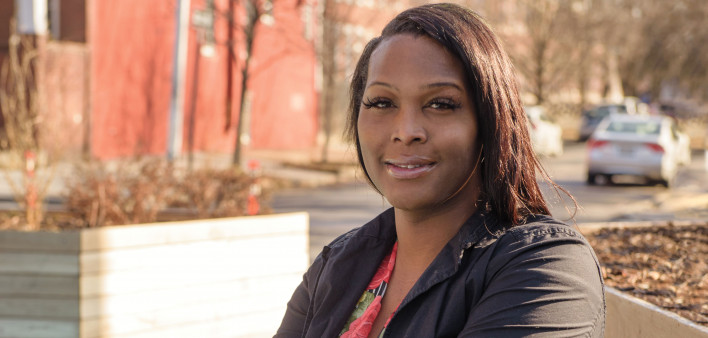As a sex worker, Iya Dammons always lived in survival mode. She experienced homelessness and violence. But Dammons wouldn’t let that be her narrative—she had an idea for moving forward.
“I wanted to empower my community,” says Dammons, a Black transgender activist from Baltimore. “This couldn’t be all that life has to offer us.”
Dammons, age 36, aspired to start an organization that would provide resources to LGBTQ people at risk for homelessness, substance use and sex work. She also specifically wanted to help Black transgender women.
Her idea became a reality in 2018, when she established Baltimore Safe Haven. Dammons is the organization’s executive director.
“It started as a mobile outreach unit driving around the areas that were known for sex work and giving out condoms,” Dammons says. “Then, it extended to transitional housing and low-barrier shelter services.”
Today, the organization provides housing at five locations to clients ranging from young adults to seniors. Clients can also enjoy hot meals and pick up groceries and clothing at a local drop-in center. Plus, the organization provides mental health support as well as legal services.
“We decided to create an infrastructure where our community can rely on us for sustainable and equitable housing,” Dammons explains.
Baltimore Safe Haven partners with real estate agents and landlords to help secure living accommodations for clients. Once they’re housed, clients are offered GED prep courses and vocational training.
“We are building [clients] up and giving them all the tools that they need,” Dammons says, “so they can enrich their community after coming through their own trials and tribulations.”
In addition, Baltimore Safe Haven supports the health of its clients and community by offering HIV testing and other prevention services. The organization tests about 500 people annually.
“[We] are totally up for the challenge to go to the most marginalized communities and provide them with HIV tests, [pre- and post-exposure prophylaxis] referrals and linkage to care,” Dammons says.
She aims to expand the organization to provide more individuals with adequate housing and other vital services. “I’d love to see a Rainbow Row, where we own a whole block,” she says.
She’d also like to see more government officials invest in Baltimore and its residents.
Even without their support, Dammons will continue to fight for the lives of the city’s transgender residents, who, she explains, experience disproportionately high death rates.
“We will march in the street,” she says. “We will knock on City Hall’s doors. We will not stop until we know that our lives matter.”
Dammons invites the public to visit Baltimore Safe Haven, whose doors are always open. She also encourages people to work with their local LGBTQ agencies, which can identify and meet their needs.
“Stay strong,” Dammons says. “I know this life can be taxing. However, there is a rainbow after the rain.”







Comments
Comments